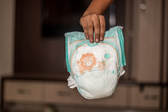
The world is on the verge of widely using 5G technology, notwithstanding a failure to properly test and prove that it is safe to use. While experts may have safety arguments about EMF and radiation exposure from our cell phones and wireless devices, many people believe that not only is it unsafe but that it is seriously detrimental to human health. Some of these people further question whether or not it is tantamount to a legalized form of human extermination or pairing down of the species. WiFi has certainly made our lives more convenient, but what is the price of that convenience and how much is too much?
Google's sister company Verily, has now partnered with Proctor & Gamble (the parent firm of Pampers) to sell "smart nappies," which will provide your baby with the first state of the art WiFi diaper. A "smart nappy" is a reusable detachable sensor that is applied to a baby's diaper and detects the presence of urine or feces. The sensor also monitors sleep patterns, feedings, room temperature and humidity. The "smart nappy" connects to WiFi and upon gathering data will notify parents by sending the information to their cell phones. Promotions for this yet to be priced sensor that is said to be available soon in the U.S., exclaim that they have eliminated the dreaded "sniff test" problem for parents.
All of this begs the question, do we really need WiFi diapers? While many are asserting privacy concerns over personal information obtained with this new technology, they are perhaps overlooking a much bigger concern. If radiation exposure from wireless devices is dangerous to our health, one could only imagine the risk associated with attaching a wireless device to your baby's diaper in close proximity to the baby's genitalia. In the past, the biggest concern with a commercial diaper was the chemical composition that supported the absorption technology. That in itself, made many parents return to using old fashioned cloth diapers. Now parents have to be concerned with potential radiation exposure from their baby's diaper.
Perhaps we need to evaluate when technology goes too far and causes more harm than good. Maybe in certain cases our quest for the latest and the greatest, should be replaced by the smartest and the safest. While some parents do exhaustive research on products to safeguard their children, others tend to believe the claims of the commercial industry especially in the name of convenient technology. We must be mindful that the protection we receive from our consumer laws is limited and finite. A child's true protection emanates from the parents.
Long Island Lawyer
Paul A. Lauto, Esq.
www.liattorney.com


 RSS Feed
RSS Feed

